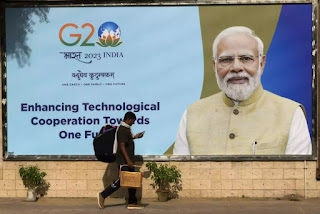OECD supports the G20 Presidency’s work
India took over the presidency of the G20 – the grouping of the world’s 20 biggest economies, which collectively account for 75-80% of global GHG emissions – in December 2022. At the transition of the presidency from Indonesia to India, the Indian prime minister, Narendra Modi, said the challenges of “climate change, terrorism, and pandemics can be solved not by fighting each other, but only by acting together”.
With control of 84 per cent of the global economy, G20 nations are the world’s driving force for development and growth. This is a good thing. However, while acknowledging the diversity and different development paths within G20 nations, this strength and influence also makes the bloc largely responsible for many of the environmental issues facing the world today.
In India, especially among civil society organisations, the focus is less on the date of the net-zero target than on how a quicker transition to a greener economy can lead to better outcomes in jobs, health and sustained economic security.
The number of G20 nations with renewable electricity targets increased over the last years and most nations with existing targets have also increased their ambitions. Three G20 nations have established themselves as leaders by announcing 100% renewable electricity targets by 2035 (Canada, Germany, United Kingdom). Only one G20 nation now has a 2030 target of less than 20% (Russia), while most G20 nations have targets of 20–50%.
“India achieved more than 125 GW of renewable energy out of the 175 GW committed by GoI [government of India] up to 2022. This achievement gave confidence to GoI to announce 500 GW by 2030,”
The G20 recognises the importance of collective action in tackling environmental challenges and climate change while promoting transitions towards more flexible, transparent and cleaner energy systems. The OECD supports the G20 Presidency’s work, building on its extensive expertise in green growth, clean and climate-resilient infrastructure, fossil fuel subsidies, energy regulation, green finance and investment, environmental taxation and Environmental, Social and Governance (ESG).
Energy storage targets. The progress of the G20 on energy storage has been modest with thirteen G20 nations implementing energy storage initiatives, but six are only at a regional level. India and South Africa are incorporating storage into their renewable energy auctions and at present, only one G20 nation (Italy) has an energy storage target.
The success of the G20 Environment and Climate Sustainability Working Group's endeavours stands as a testimony to the collective will and determination of the G20 nations to tackle environmental challenges head-on. As the India Presidency's term draws to a close, the legacy of this fruitful collaboration will continue to inspire and guide global efforts towards a more sustainable and prosperous world.
